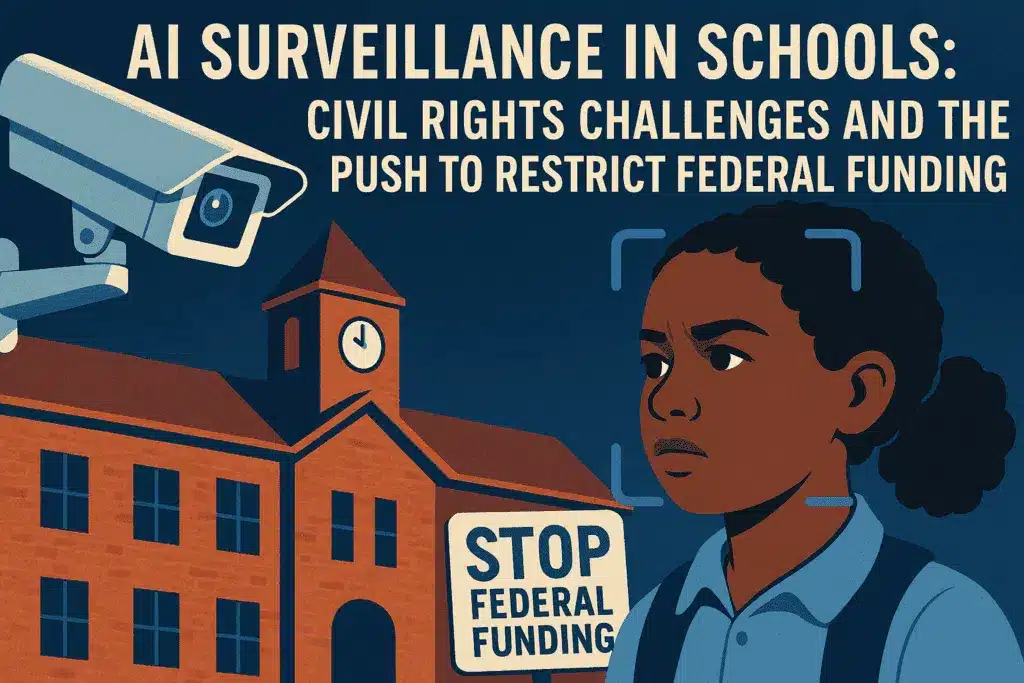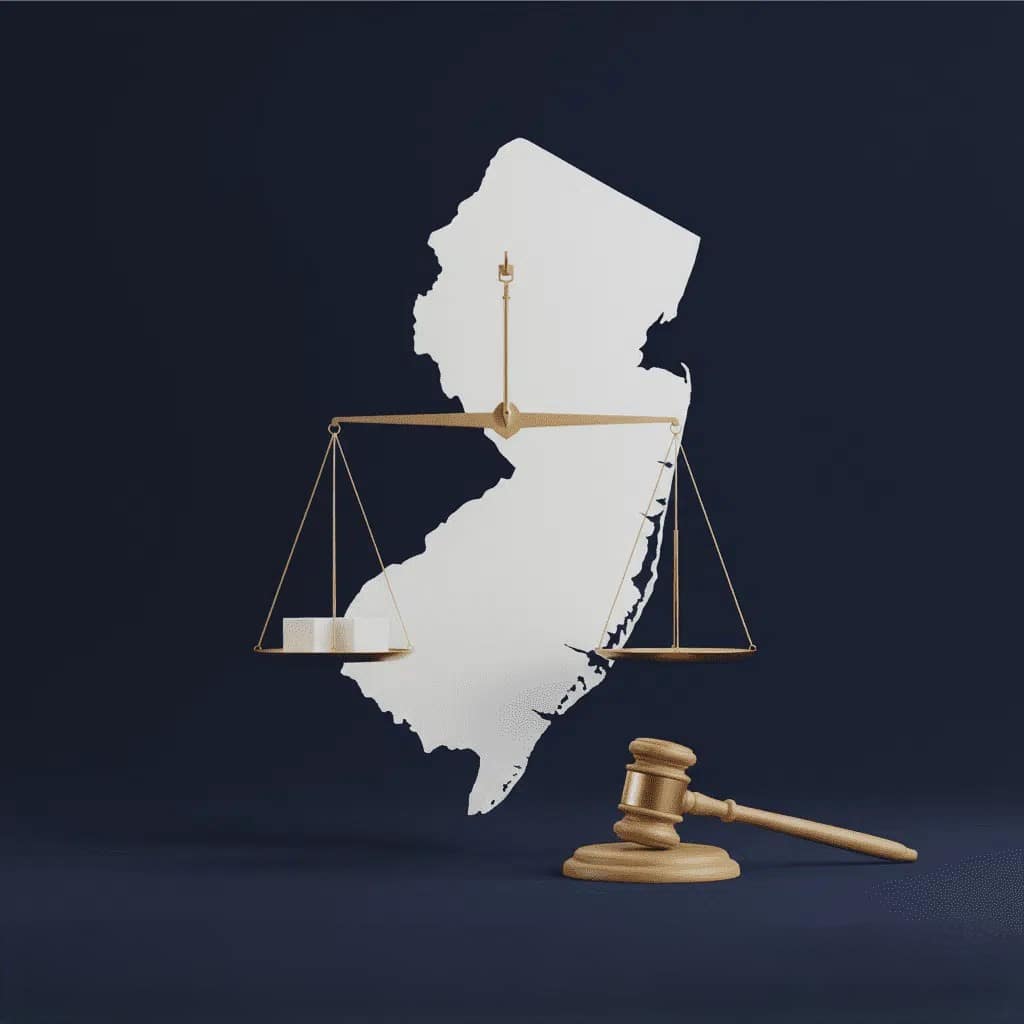Artificial intelligence is increasingly integrated into American education, promising efficiency, insights, and safer school environments. But one of its most contested applications—AI surveillance in schools—has become the subject of growing legal and civil rights scrutiny. Marketed as a way to monitor student behavior and prevent harm, student surveillance technology raises questions about privacy, discrimination, and constitutional boundaries, especially when funded by public dollars.
In April 2024, civil rights and education advocacy groups submitted a letter to the U.S. Department of Education requesting that federal funds not be used to purchase AI-powered monitoring tools for schools. Their concerns, detailed in a report covered by Education Week, emphasized potential harm to marginalized student populations and highlighted what they view as an absence of adequate regulatory oversight. The full article, titled “Civil Rights Groups Seek Federal Funding Ban on AI-Powered Surveillance Tools,” outlines the coalition’s rationale.
As attorneys focused on education law and student rights, RJLLP explores the legal considerations surrounding artificial intelligence school monitoring, including potential statutory conflicts, due process concerns, and implications for federal policy. This article provides a legal analysis of the issues raised and discusses how stakeholders—schools, parents, and policymakers—may evaluate their obligations and risks.
Surveillance Technology in Public Education
AI-powered tools used in schools can include content filters, keyword monitoring software, facial recognition systems, and predictive analytics platforms. These systems may scan student communications, analyze behavior patterns, or flag conduct deemed risky based on algorithmic models. While intended to promote safety, these technologies sometimes operate without explicit legal frameworks or public transparency.
From a legal standpoint, their use invites careful review under several federal and state protections. For example, the Family Educational Rights and Privacy Act (FERPA) governs access to and disclosure of student education records. The use of surveillance software that collects or stores student communications may implicate FERPA when such data is considered part of a student’s record.
Additionally, the use of surveillance tools in school settings must be reconciled with students’ Fourth Amendment rights, which protect against unreasonable searches. Courts have held that these rights are modified but not eliminated in educational environments. The use of tools that monitor behavior or location data without individualized suspicion could raise legal questions, particularly where parental notification or consent is lacking.
Civil Rights Implications and Federal Funding Concerns
In their April 2024 letter, the coalition of civil rights groups asserted that federal funds—particularly those distributed through COVID-era relief packages—should not be used to purchase AI surveillance tools that, in their view, may infringe upon students’ rights or disproportionately affect certain student populations. This request was directed to the U.S. Department of Education, urging it to exercise discretion over discretionary and formula-based grant programs.
The legal argument underlying this request references Title VI of the Civil Rights Act, which prohibits discrimination based on race, color, or national origin in programs receiving federal financial assistance. If AI surveillance technologies are found to result in disparate impacts on students protected by Title VI, their use may become the subject of federal investigation or litigation.
The advocates also raise concerns under the Americans with Disabilities Act (ADA) and Section 504 of the Rehabilitation Act, where surveillance practices might have different effects on students with disabilities or lead to decisions inconsistent with their educational accommodations.
These concerns, while policy-oriented, are rooted in existing federal law and reflect an evolving intersection between emerging technology and traditional civil rights protections.
The Legislative Landscape
To date, there is no federal statute specifically governing AI surveillance in schools. However, calls for regulation are increasing, with some members of Congress expressing interest in introducing legislation that would set transparency, equity, and data protection standards for educational technology systems.
Any future legislative action would likely build upon existing federal frameworks, including FERPA, the Children’s Online Privacy Protection Act (COPPA), and civil rights statutes applicable to public education. In the meantime, local and state education agencies remain the primary decision-makers in adopting these tools, though their use may eventually be subject to greater federal oversight.
Schools and school districts considering such technologies are advised to evaluate their procurement processes, ensure vendor compliance with applicable privacy laws, and document the rationale for any surveillance initiative—especially if it involves federal funding.
Ethical Considerations and Best Practices
Educators and administrators often face pressure to adopt new technologies that promise safety improvements. However, AI-based monitoring tools may also create unintended consequences, such as reducing trust between students and staff or raising the risk of misinterpretation in algorithmic decision-making. These outcomes can affect school climate and create broader equity concerns.
From an ethical perspective, transparency and stakeholder engagement are essential. Parents, students, and faculty should have opportunities to understand what surveillance systems are being used, what data is collected, how it is stored, and under what circumstances it may be shared. Ensuring that these practices align with community expectations and legal requirements is crucial.
How RJLLP Supports Clients on Education Surveillance Issues
RJLLP counsels clients on a range of education law issues, including student privacy, civil rights compliance, and regulatory risk in public and charter school contexts. We offer legal reviews of surveillance technology policies, advise on FERPA and Title VI obligations, and assist with internal audits, complaint responses, and litigation strategy where appropriate.
Our attorneys remain closely engaged with national developments in education technology oversight and provide up-to-date guidance on how schools and families can navigate these evolving issues. We also offer training and policy development services to help school districts comply with legal standards while maintaining environments that support student learning and well-being.
Contact RJLLP
If you are a parent, educator, or policymaker with questions about AI surveillance in schools—or if you are facing a legal issue involving student privacy, civil rights, or federal funding—we invite you to contact our team for a consultation. Our firm provides tailored legal advice grounded in experience and a commitment to protecting the integrity of public education.
This article references reporting from Education Week, April 2024: “Civil Rights Groups Seek Federal Funding Ban on AI-Powered Surveillance Tools.”










